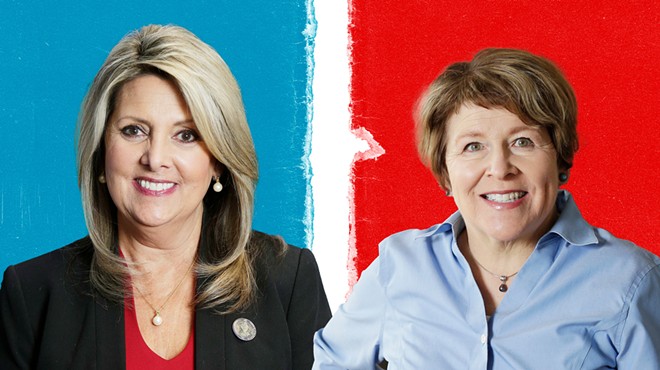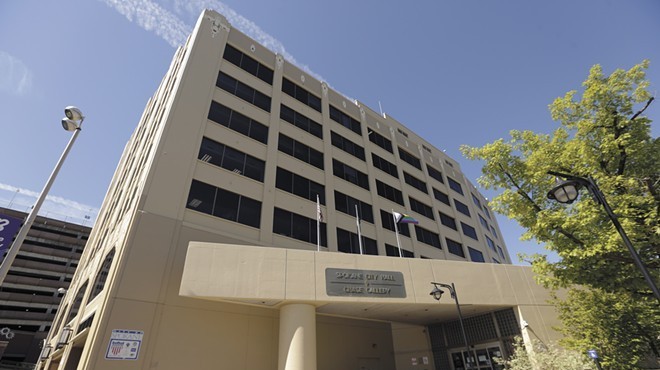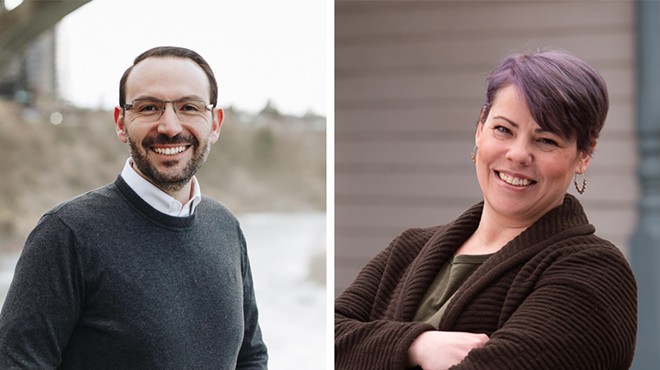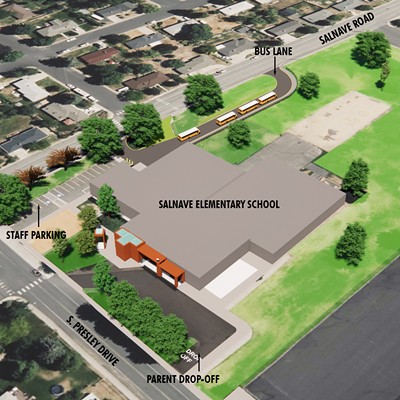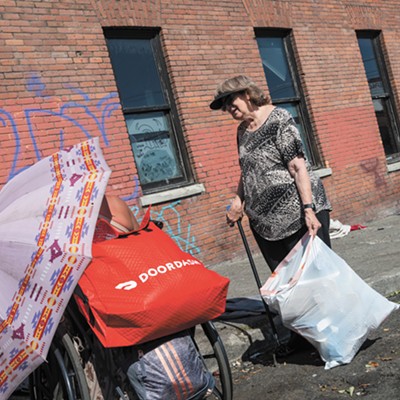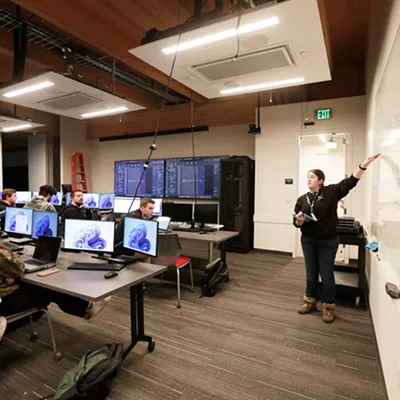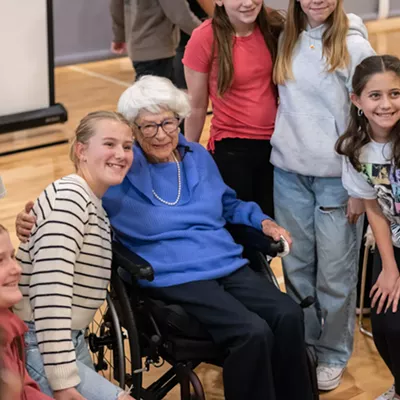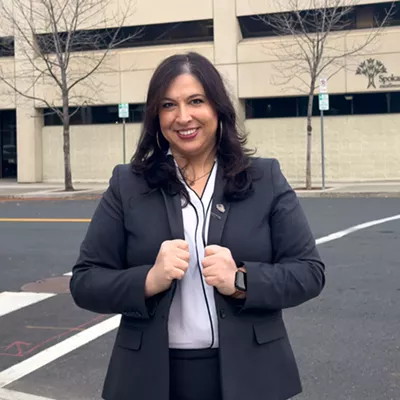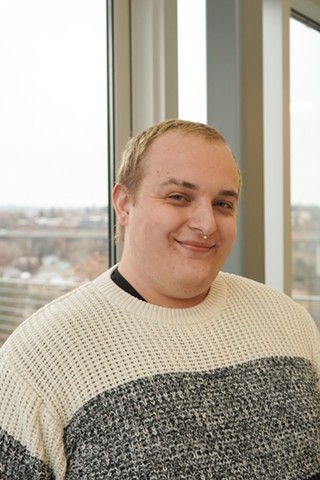
Jaime Stacy knows hope is an action, that's why she's letting it drive her campaign for the Mead School Board.
"Hope allows us to build a sustainable house of education around a plan that says, 'You belong, you have a purpose, and you're included here,'" she says.
If elected, Stacy hopes to ensure that all students feel they belong and to extend support to students, teachers and parents, specifically when it comes to curriculum and mental health. She would also be the first Black woman to ever serve on the district's school board.
Her opponent, Jennifer Killman, hopes to expel what she calls "social agendas" from the school district in an effort to improve academic performance. She says this includes Critical Race Theory (or CRT, which isn't taught at Mead, or any other K-12 school in the Inland Northwest), books with questionable content, and LGBTQ+ issues. While Killman believes that teachers should be able to answer student inquiries on these topics, she doesn't think any of them belong in current curricula.
The issues separating Stacy and Killman aren't unique to their school board contest. They're echoed throughout school board races across the Inland Northwest and the country. In California, a conservative majority on the Temecula Valley Unified School Board voted to ban CRT in December 2022 on their first day in office, according to a Politico report. At least five other California school boards have banned or condemned CRT too, even though it isn't taught outside collegiate settings.
The Mead School Board tried to ban CRT and gender studies in September 2022, but fell short in a 2-3 vote.
Travis Ridout, a political science professor at Washington State University, says campaign messages such as these are often used as a way to turn out like-minded voters.
"These issues are how they send messages to other far-right voters," says Ridout.
Ridout has been teaching political science for 20 years. In that time he's seen the political landscape become less civil and more polarized. Part of that, he believes, is because local politics have overwhelmingly become nationalized.
Ridout remembers a time when folks may have voted for a Republican president but then also elected Democrats to county or city positions. Now, he says, politicians trying to find bipartisan solutions are often lambasted for "selling out" to the other side.
He doesn't expect this to change anytime soon.
"There's nothing in the present situation that makes me think that this is a little phase," he says. "Our politics are really calcified as they are."
Medical Lake, with a population of just over 4,800, had the most crowded primary ballot in the entire state with 17 candidates running for four spots.
Dennis Schilling, who hopes to fill the District 3 seat on the Medical Lake School Board, believes that "LGBTQ ideology" is disruptive and has no place in a K-12 school system. He says that state laws are taking away from students' academic success, and if elected, he'd want to find ways to improve on the Washington Office of the Superintendent of Public Instruction (OSPI) report card. (Medical Lake School District outpaces the state average for test scores.)
Schilling also thinks the state is overstepping its boundaries with the implementation of Social Emotional Learning — an educational framework that focuses on children managing their emotions and establishing relationships, according to the state Professional Educator Standards Board.
Schilling believes parents should teach this to their children, not schools.
"Washington is pushing hard on these issues," he says. "It feels like they're trying to separate kids from their parents."
His opponent, incumbent Laura Parsons, has a long history in Medical Lake politics. She was first elected to the school board in 2019 and previously served four terms on the Medical Lake City Council — including a stint as mayor pro tem.
She believes that rhetoric like Schilling's that's found its way into school board races is "hateful" and shouldn't have a place in any school district.
"A lot of [LGBTQ+ youth] are hiding who they are in Medical Lake," she says. "Their lives are already hard enough, and I don't know why any adult would want to make it harder for them."
Roughly 0.5% of adults in Washington state — about 33,000 people — identify as transgender, according to research published in June 2022 by the UCLA Williams Institute. Transgender youth between 13-17 make up 1% in the state, or about 5,000 people.
As of Oct. 1, 2022, five students in the Medical Lake School District identified as Gender X, according to OSPI. Gender X indicates a student who doesn't identify as male or female, however, this technically only applies to gender-nonconforming and nonbinary students.
There's not much a school board director can do to change laws passed by the state Legislature and signed by a governor. Schilling says that won't dissuade him.
"One of my goals as a school board member would be to examine these laws," he says. "They're pretty broad and vague."
There are more than 50 contested school board races in the Inland Northwest, and not every race follows these trends.
In Cheney, for instance, school board candidates are focused on addressing population growth and improving schools through an upcoming bond, not hot button issues of race and gender.
After serving two terms, Cheney School Board member Stacy Nicol decided against seeking re-election. This left the spot open for a newcomer.
One candidate, Bill Hanson, says he wouldn't have sought election if Nicol had decided to seek another term. He thinks that student vaping is one of the biggest issues to tackle.
His opponent, John Boerger, spent 14 years as a school board director in Lake Stevens. He thinks the district's main focus should be on how to handle the continuous growth that the city has experienced.
Both candidates support the district's upcoming bond.
"I totally get where [the school board] is coming from, and I'm totally on board with it," Hanson says. "If voters reject it, I would be excited to look at some other options."
"I think you always run that risk of people not wanting taxes to raise, but if we're proactive, we can best respond to our students' needs," Boerger says. "I would make that a priority to make sure we have facilities to help students." ♦



